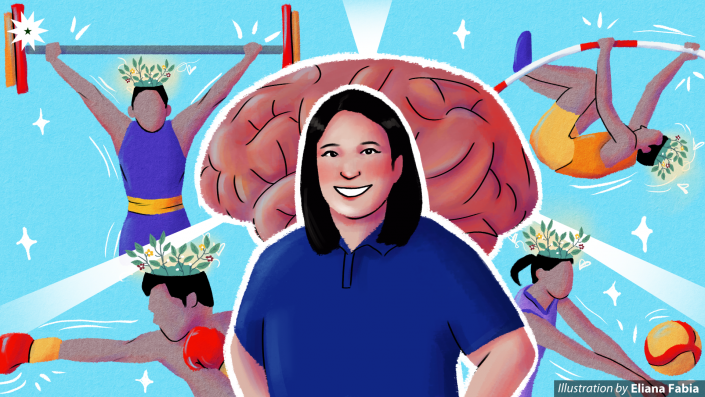
Sports is as much a mental game as it is a physical one. An athlete’s physical prowess may be more evident in competitions, but mental fortitude can also make or break a championship. Sadly, this reflects how psychology is often overlooked in sports and how this can have disastrous consequences.
In the Philippines, only a few universities offer Sports Psychology as an academic program. As a result, even fewer Filipinos pursue it as a career. Despite it being an uncommon branch, Dr. Karen Katrina Trinidad, Olympian Hidilyn Diaz’s mental coach, still chose to become a sports psychologist—finding herself at the vanguard of a fundamental shift in the field.
Passion in action
Trinidad’s professional life revolves around Psychology, from being a faculty member under the University of Santo Tomas’ Department of Psychology to working as a consultant at the Philippine Sports Commission. Her fascination with Sports Psychology, however, started with her interest in treating sports professionals.
Trinidad has coached many of our country’s national athletes throughout the years. Being surrounded by individuals who perform seemingly superhuman feats regularly, “You will feel like you’re old because you are surrounded by exceptional people,” she jokes.
But the profession is more than just having front-row seats to exciting games. Mental coaching requires intricate work and meticulous observations from the psychologist. One must thoroughly study the athlete’s cognition, emotions, and behavior throughout their performance, taking into account the most minute of details. “Just as physical fitness helps our bodies to stay strong, mental fitness helps us achieve and sustain a state of good mental health,” Trinidad advises.
Ins and outs
The entire process surrounding mental coaching is a give-and-take. Trinidad insists, “It’s very important to establish good rapport [with] an athlete so that you can design and adjust the program accordingly.” As such, successful sessions only happen when both the psychologist and athlete are in sync—the athlete is willing to be assisted, and the psychologist is ready to accommodate.
Problems such as injuries, overtraining, and internal or external pressure can come to define an athlete. These are the cruxes that mental health coaches aim to resolve; after all, a sound mind opens the possibility for an even powerful body.
Many presume that athletes are immune to mental health issues due to their strong outward appearance and willpower. But if Simone Biles’ withdrawal from the recently concluded 2020 Tokyo Olympics proved anything, it is that the discourse on athletes’ mental well-being has been long overdue. This conversation may not sit well with some, but Trinidad reminds that “Elite athletes are also vulnerable to mental health disorders as a result of the various stressors they experience in their sporting environment.”
According to her, “Aside from the fact that they trained several hours a day for one event, the Olympics is a competition of the best among the best.” Thus, the room for error is slim to none.
However, all the stress is replaced by fulfillment and joy when she sees the effect of helping an athlete reach their full potential, especially when her client achieves a new milestone or even by simply seeing them put her advice into action. “[It’s] fulfilling and [I’m] happy working because I know I can help athletes cope with [their] competitive fears,” she says.
The golden win
Trinidad’s most recent accomplishment was being part of Team HD—the team that helped Hidilyn Diaz bag the first gold medal for the Philippines during the 2020 Olympics. Team HD is Diaz’s personal team of specialists focused on conditioning and preparing Diaz’s well-being for the Olympics.
Trinidad reveals that “we underwent a lot of assessment and adjustment with her mental skills, collaborating with other people who are of equal importance to the team.” Many meetings were held to strategize the best course of action for Diaz. In the end, the Olympian’s historic performance was the fruit of the team’s dedication, determination, and bond. “It was not easy preparing for it for five years, but it [was] all worth it,” Trinidad declares.
Diaz winning the gold medal by lifting a combined weight of 224 kilograms—also setting a new Olympic record—was definitely a moment for the Philippines. Trinidad says it’s one of the most memorable things she treasures as a mental coach for many years. “When [I heard] the Philippine national anthem [being] played during the awarding ceremony of Ms. Hidilyn Diaz—priceless.”
Into the spotlight
Despite the recent surge of interest in the field, Trinidad shares that sports psychologists in the country are few and far between. The lack of public knowledge on the field’s existence and the laborious journey of becoming a licensed expert all contribute to the diminished presence of Sports Psychology in the country—a sentiment echoed during the recent virtual Philippine Professional Sports Summit.
To make things worse, she is doubtful that most professional athletes in the Philippines prioritize hiring mental coaches, as there is still a deeply-rooted stigma around mental health.
However, Trinidad is optimistic that through Diaz’s triumph, the momentum will finally shift in Sports Psychology’s favor. “Diaz’s success showed the Philippines that to be successful [in sports], you need to have a Sports Science team with you because technically, sports is [a] science,” Trinidad remarks. This scientific approach may just be what most athletes need to emerge as champions.
More than just a means to help athletes and coaches achieve their full potential, Trinidad’s profession humanizes athletes so that people see them beyond their extraordinary abilities—turning their vulnerabilities and weaknesses into strengths that would help maximize their talents. Through Sports Psychology, Trinidad is hopeful that the once-pipe dreams of many Filipino athletes will soon be a reality.
